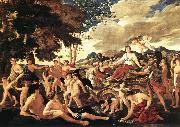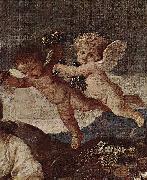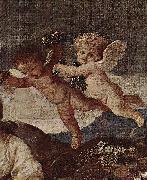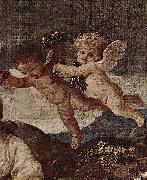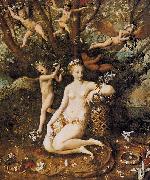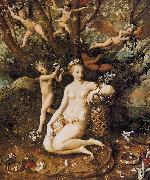Wholesale Oil Painting No Minimum |
|||||||||||
|
|
|||||||||||

|
|||||||||||
|
|
|
||||||||
Nicolas PoussinFrench 1594-1665 Nicolas Poussin Galleries The finest collection of Poussin's paintings, in addition to his drawings, is located in the Louvre in Paris. Besides the pictures in the National Gallery and at Dulwich, England possesses several of his most considerable works: The Triumph of Pan is at Basildon House, near to Pangbourne, (Berkshire), and his great allegorical painting of the Arts at Knowsley. The later version of Tancred and Erminia is at the Barber Institute in Birmingham. At Rome, in the Colonna and Valentini Palaces, are notable works by him, and one of the private apartments of Prince Doria is decorated by a great series of landscapes in distemper. Throughout his life he stood aloof from the popular movement of his native school. French art in his day was purely decorative, but in Poussin we find a survival of the impulses of the Renaissance coupled with conscious reference to classic work as the standard of excellence. In general we see his paintings at a great disadvantage: for the color, even of the best preserved, has changed in parts, so that the harmony is disturbed; and the noble construction of his designs can be better seen in engravings than in the original. Among the many who have reproduced his works, Audran, Claudine Stella, Picart and Pesne are the most successful. |
||||||||
|
|
||||||||
The Triumph of Flora
The Triumph of Flora Painting ID:: 10095 |
1631 Oil on canvas
165 x 241 cmLouvre 1631 Oil on canvas 165 x 241 cmLouvre |
|||||||
|
|
||||||||
Nicolas PoussinFrench 1594-1665 Nicolas Poussin Galleries The finest collection of Poussin's paintings, in addition to his drawings, is located in the Louvre in Paris. Besides the pictures in the National Gallery and at Dulwich, England possesses several of his most considerable works: The Triumph of Pan is at Basildon House, near to Pangbourne, (Berkshire), and his great allegorical painting of the Arts at Knowsley. The later version of Tancred and Erminia is at the Barber Institute in Birmingham. At Rome, in the Colonna and Valentini Palaces, are notable works by him, and one of the private apartments of Prince Doria is decorated by a great series of landscapes in distemper. Throughout his life he stood aloof from the popular movement of his native school. French art in his day was purely decorative, but in Poussin we find a survival of the impulses of the Renaissance coupled with conscious reference to classic work as the standard of excellence. In general we see his paintings at a great disadvantage: for the color, even of the best preserved, has changed in parts, so that the harmony is disturbed; and the noble construction of his designs can be better seen in engravings than in the original. Among the many who have reproduced his works, Audran, Claudine Stella, Picart and Pesne are the most successful. |
||||||||
|
|
||||||||
|
|
The Triumph of Flora
The Triumph of Flora Painting ID:: 79518 |
ca. 1627-1629(1627-1629)
Oil on canvas
165 x 241 cm (65 x 94.9 in)
cjr ca. 1627-1629(1627-1629) Oil on canvas 165 x 241 cm (65 x 94.9 in) cjr |
||||||
|
|
||||||||
Nicolas PoussinFrench 1594-1665 Nicolas Poussin Galleries The finest collection of Poussin's paintings, in addition to his drawings, is located in the Louvre in Paris. Besides the pictures in the National Gallery and at Dulwich, England possesses several of his most considerable works: The Triumph of Pan is at Basildon House, near to Pangbourne, (Berkshire), and his great allegorical painting of the Arts at Knowsley. The later version of Tancred and Erminia is at the Barber Institute in Birmingham. At Rome, in the Colonna and Valentini Palaces, are notable works by him, and one of the private apartments of Prince Doria is decorated by a great series of landscapes in distemper. Throughout his life he stood aloof from the popular movement of his native school. French art in his day was purely decorative, but in Poussin we find a survival of the impulses of the Renaissance coupled with conscious reference to classic work as the standard of excellence. In general we see his paintings at a great disadvantage: for the color, even of the best preserved, has changed in parts, so that the harmony is disturbed; and the noble construction of his designs can be better seen in engravings than in the original. Among the many who have reproduced his works, Audran, Claudine Stella, Picart and Pesne are the most successful. |
||||||||
|
|
||||||||
|
|
The Triumph of Flora
The Triumph of Flora Painting ID:: 79598 |
ca. 1627-1629(1627-1629)
Oil on canvas
165 x 241 cm (65 x 94.9 in)
cjr ca. 1627-1629(1627-1629) Oil on canvas 165 x 241 cm (65 x 94.9 in) cjr |
||||||
|
|
||||||||
Nicolas PoussinFrench 1594-1665 Nicolas Poussin Galleries The finest collection of Poussin's paintings, in addition to his drawings, is located in the Louvre in Paris. Besides the pictures in the National Gallery and at Dulwich, England possesses several of his most considerable works: The Triumph of Pan is at Basildon House, near to Pangbourne, (Berkshire), and his great allegorical painting of the Arts at Knowsley. The later version of Tancred and Erminia is at the Barber Institute in Birmingham. At Rome, in the Colonna and Valentini Palaces, are notable works by him, and one of the private apartments of Prince Doria is decorated by a great series of landscapes in distemper. Throughout his life he stood aloof from the popular movement of his native school. French art in his day was purely decorative, but in Poussin we find a survival of the impulses of the Renaissance coupled with conscious reference to classic work as the standard of excellence. In general we see his paintings at a great disadvantage: for the color, even of the best preserved, has changed in parts, so that the harmony is disturbed; and the noble construction of his designs can be better seen in engravings than in the original. Among the many who have reproduced his works, Audran, Claudine Stella, Picart and Pesne are the most successful. |
||||||||
|
|
||||||||
|
|
The Triumph of Flora
The Triumph of Flora Painting ID:: 82423 |
ca. 1627-1629(1627-1629)
Medium Oil on canvas
Dimensions 165 x 241 cm (65 x 94.9 in)
cyf ca. 1627-1629(1627-1629) Medium Oil on canvas Dimensions 165 x 241 cm (65 x 94.9 in) cyf |
||||||
|
|
||||||||
|
|
||||||||
|
|
The Triumph of Flora
The Triumph of Flora Painting ID:: 85190 |
Date c. 1560(1560)
Medium Oil on wood
Dimensions Height: 131 cm (51.6 in). Width: 110 cm (43.3 in).
cjr Date c. 1560(1560) Medium Oil on wood Dimensions Height: 131 cm (51.6 in). Width: 110 cm (43.3 in). cjr |
||||||
|
|
||||||||
Giovanni Domenico Tiepolo(August 30, 1727 - March 3, 1804) was a Venetian painter and printmaker in etching. He was the son of artist Giovanni Battista Tiepolo and elder brother of Lorenzo Baldissera Tiepolo.. Domenico was born in Venice, studied under his father, and by the age of 13 was the chief assistant to him. He was one of the many assistants, including Lorenzo, that transferred the designs of his father (executed in the 'oil sketch' invented by the same). By the age of 20, he was producing his own work for commissioners. He assisted his father in Werzburg 1751-3, decorating the famous stairwell fresco, in Vicenza at the Villa Valmarana in 1757, and in Madrid at the palace of Charles III from 1762-70. |
||||||||
|
|
||||||||
|
|
The Triumph of Flora
The Triumph of Flora Painting ID:: 89500 |
1560(1560)
Medium oil on wood
cyf 1560(1560) Medium oil on wood cyf |
||||||
|
|
||||||||
|
Giovanni Domenico Tiepolo (August 30, 1727 - March 3, 1804) was a Venetian painter and printmaker in etching. He was the son of artist Giovanni Battista Tiepolo and elder brother of Lorenzo Baldissera Tiepolo.. Domenico was born in Venice, studied under his father, and by the age of 13 was the chief assistant to him. He was one of the many assistants, including Lorenzo, that transferred the designs of his father (executed in the 'oil sketch' invented by the same). By the age of 20, he was producing his own work for commissioners. He assisted his father in Werzburg 1751-3, decorating the famous stairwell fresco, in Vicenza at the Villa Valmarana in 1757, and in Madrid at the palace of Charles III from 1762-70. The Triumph of Flora 1560(1560) Medium oil on wood cyf |
||||||||
|
|
||||||||
|
Prev Next
|
||||||||
|
|
||||||||
|
Related Paintings to Giovanni Domenico Tiepolo :. |
||||||||
|
|
||||||||
|
CONTACT US |
